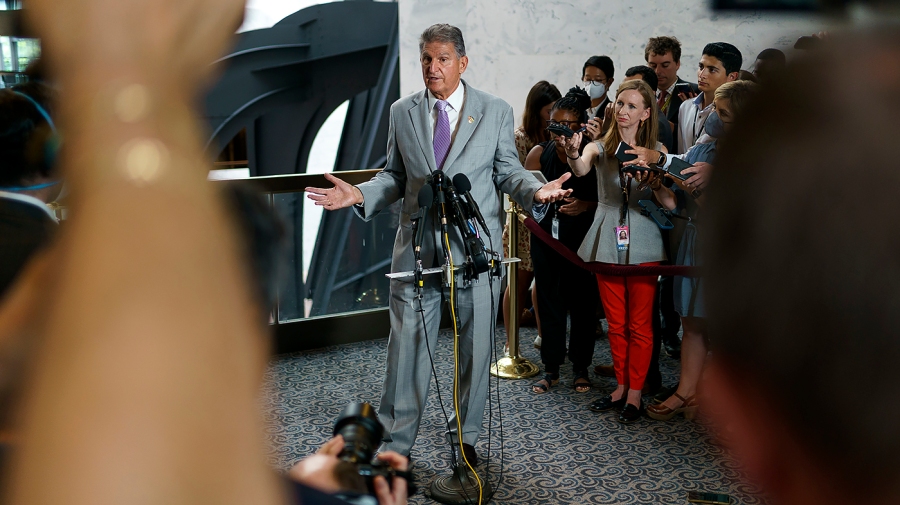Sens. Joe Manchin (D-W.Va.) and Krysten Sinema (D-Ariz.) are in discussions over a climate and tax package, while the Biden administration is launching a pilot program dealing with rural wastewater.
This is Overnight Energy & Environment, your source for the latest news focused on energy, the environment and beyond. For The Hill, we’re Rachel Frazin and Zack Budryk. Someone forward you this newsletter? Subscribe here.
Us inheritance tax for non us citizens Manchin, Sinema discussing reconciliation
Sen. Joe Manchin (D-W.Va.) says he is exchanging materials with Sen. Kyrsten Sinema (D-Ariz.) to help her better understand the broad tax reform and climate bill he negotiated with Senate Majority Leader Charles Schumer (D-N.Y.) and that he is open to her suggestions as Democrats seek 50 votes to put the bill on the floor.
Manchin finally got a chance to speak to Sinema after lunch Tuesday, when she was scheduled to preside over the chamber.
Manchin was tight-lipped about the details of the conversation but made clear that he’s willing to consider changes she might want to make to the deal, which would raise $739 billion in new revenue over the next decade and reduce the deficit by more than $300 billion.
“We had a nice time. We had a nice time. Next?” Manchin said Tuesday when reporters pressed him for details of his chat with Sinema while she sat at the Senate dais.
Asked again to shed any light on whether Sinema will vote for the bill, which would give President Biden the biggest legislative victory of this first two years in office, Manchin said his colleague would make her own decision.
“We’re exchanging text back and forth,” he said, adding that Sinema is “extremely bright. She works hard. She makes good decisions based on facts. I’m reliant on that.”
Manchin said Schumer is “working with all the caucus” to get buy-in to get the budget reconciliation bill to the floor later this week.
Even though Sinema played a major role in negotiating the prescription drug reform component of the bill and set the broad parameters of the tax chapter, she learned about the deal at the same time as all of her colleagues and the general public — through a press release.
Manchin said he’s open to considering changes suggested by Sinema, including on a proposal to close the carried interest tax loophole, one of his priorities.
“We’re just basically exchanging back and forth whatever I have that she hasn’t seen. And our staffs are working together very closely,” he said, adding that he’s also exchanging materials relevant to the bill with other Democratic and Republican senators.
Read more here from The Hill’s Alexander Bolton.
Us inheritance tax for non us citizens EPA, USDA take on rural water sanitation
The Biden administration announced plans on Tuesday to leverage financial and technical tools to ensure that historically underserved communities can access wastewater sanitation resources.
The pilot initiative, a joint effort between the Environmental Protection Agency (EPA) and the U.S. Department of Agriculture (USDA), will focus on 11 rural communities across the country where residents lack basic wastewater management.
“The America that we all believe in is a land of opportunity,” EPA Administrator Michael Regan said in a statement. “But, for historically marginalized communities from Alabama to Alaska, that opportunity is stolen when basic sanitation doesn’t work — exposing adults and children to backyard sewage and disease.”
Through the Closing America’s Wastewater Access Gap Community Initiative, the EPA and USDA will be working with Mississippi, New Mexico, North Carolina, West Virginia and tribal nations to help communities take advantage of relevant federal funding opportunities.
One such resource comes from last year’s bipartisan infrastructure bill, which provides $11.7 billion in loans and grants for water infrastructure initiatives, including wastewater management projects, the initiative’s partners said.
“President Biden has been clear — we cannot leave any community behind as we rebuild America’s infrastructure with the Bipartisan Infrastructure Law,” White House infrastructure coordinator Mitch Landrieu said.
“This includes rural and Tribal communities who for too long have felt forgotten,” he added.
About 2.2 million people in the U.S. lack basic running water and indoor plumbing, while even more live with inadequate sewage infrastructure that endangers the health of residents, according to the groups.
The new collaboration, the agencies said, will help communities access the financing and technical assistance that is available to improve wastewater infrastructure — aiming to “close the gap” for underserved populations.
The 11 communities included in the pilot program are Bolivar County, Miss.; Doña Ana County, N.M.; Duplin County, N.C.; Greene County, Ala.; Halifax County, N.C.; Harlan County, Ky.; Lowndes County, Ala.; McDowell County, W.Va.; Raleigh County, W.Va.; San Carlos Apache Tribe, Ariz.; and Santo Domingo Pueblo, N.M.
Read more here from The Hill’s Sharon Udasin
SENATORS AGREE TO PACT ACT VOTE
Senate Republicans have reached an agreement to pass legislation expanding benefits for veterans who are suffering illnesses due to toxic exposures, after they blocked the bill last week and sparked outrage from the veteran community — and comedian Jon Stewart.
“We expect to have an agreement on the PACT Act with amendments,” Senate Majority Leader Charles Schumer (D-N.Y.) said. “I believe it will pass and pass this evening. So, that’s very good news.”
A vote on the measure is expected early Tuesday evening.
Schumer said that the Senate will vote on three amendments to the bill, with 60 votes being needed to pass those bills. The upper chamber will then move to finally pass the bill.
The deal will also allow the upper chamber to vote on Finland and Sweden joining NATO on Friday.
The agreement comes as Republicans have been trying to find a way to end a standoff over the bill after blocking the measure by a vote of 55-42 last Wednesday.
Read more here from The Hill’s Jordan Williams.
A FLOOD OF NEWS
High-tide flooding broke or tied records in three locations in U.S. coastal areas in the past year, according to data released Tuesday by the National Oceanic and Atmospheric Administration (NOAA).
This type of flooding has become increasingly frequent across the country but will likely decline this year, according to NOAA. The administration attributed the decrease to the La Niña weather phenomenon.
The increases are likely to be concentrated along the East Coast and Gulf of Mexico, where NOAA is predicting a 150 percent increase from the year 2000.
Since May of this year, three different NOAA-monitored locations have tied or broken previous records for number of high-tide flooding days. Reedy Point, Del., saw a new high of six events, while Kwajalein Island in the Pacific broke its 2021 record with four days. South Carolina’s Springmaid Pier saw 11 events, tying its 2021 high.
High-tide flooding occurs when ocean water floods into low-lying areas during high-tide periods, usually following tides of between 1.75 and 2 feet above the daily average. In years past, these events have been limited to storms, but they have recently become common during prevailing-wind changes or even full moons.
Read more here.
WHAT WE’RE READING
- EPA whistleblowers provide new evidence of ongoing failure to assess dangerous chemicals (The Intercept)
- Sewage sludge contaminated with toxic forever chemicals spread on thousands of acres of Chicago-area farmland (Chicago Tribune)
- How corn fields are about to make the Midwest unbearably humid (The Washington Post)
- Power Companies Enter Peak Hurricane Season Lacking Enough Transformers (The Wall Street Journal)
- BLM agrees to reconsider grazing at sensitive Ariz. site (E&E News)
That’s it for today, thanks for reading. Check out The Hill’s Energy & Environment page for the latest news and coverage. We’ll see you tomorrow.
VIEW FULL VERSION HERE
This news is brought to you by IWTA. Founded in 2015 and located on Avenue of the Americas, in the heart of New York City, International Wealth Tax Advisors provides highly personalized, secure and private global tax, GILTI, FATCA, Foreign Trusts consulting and accounting to many IWTAS.COM clients worldwide, including: Singapore, China, Mexico, Ecuador, Peru, Brazil, Argentina, Saudi Arabia, Pakistan, Afghanistan, South Africa, United Kingdom, France, Spain, Switzerland, Australia and New Zealand.


:quality(70)/cloudfront-eu-central-1.images.arcpublishing.com/irishtimes/JVW4RJLAI7KUUXOOGF7IIQBOUA.jpg)
:quality(70)/s3.amazonaws.com/arc-authors/irishtimes/e66dc83e-2b9f-43a3-82e5-9664be5c1192.png)











